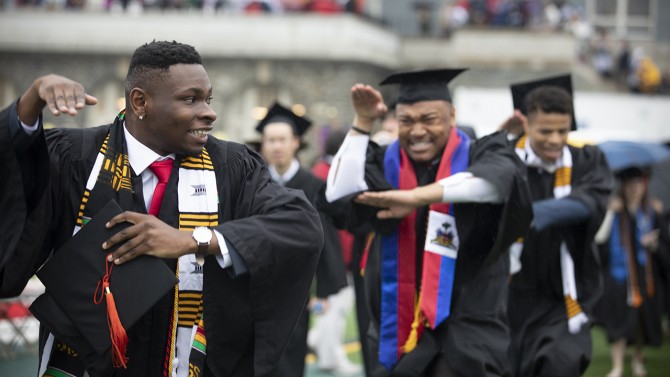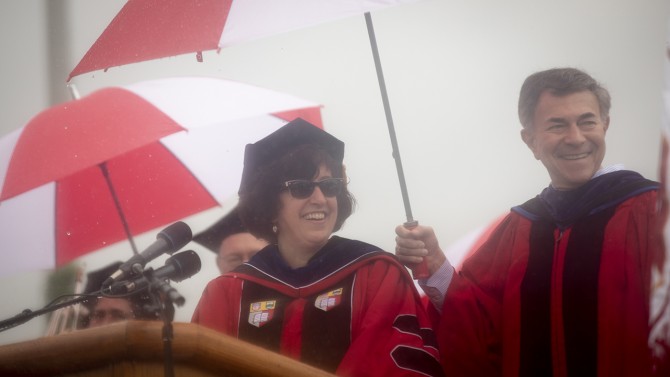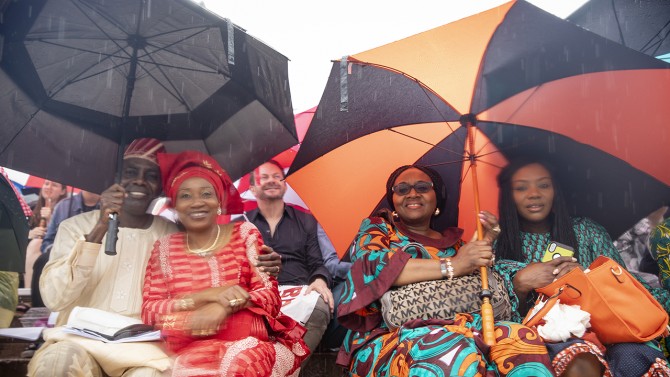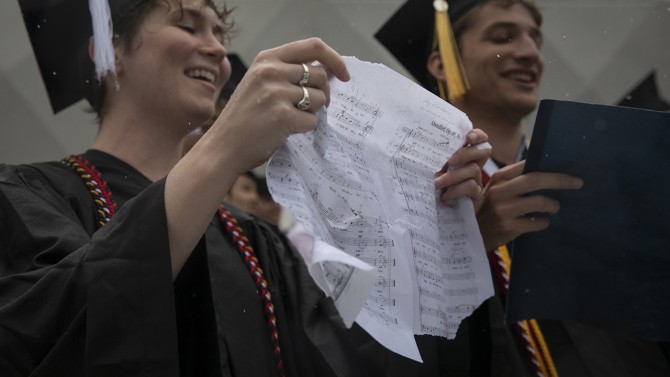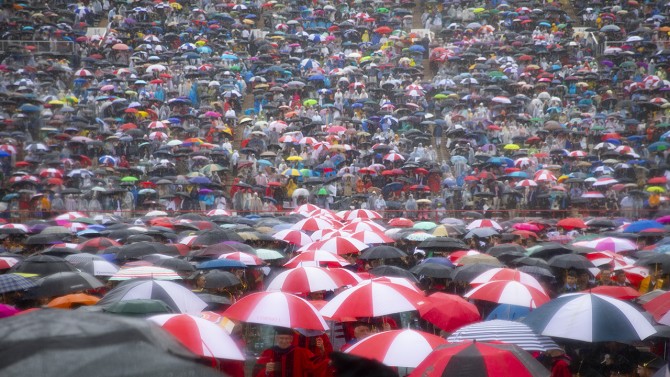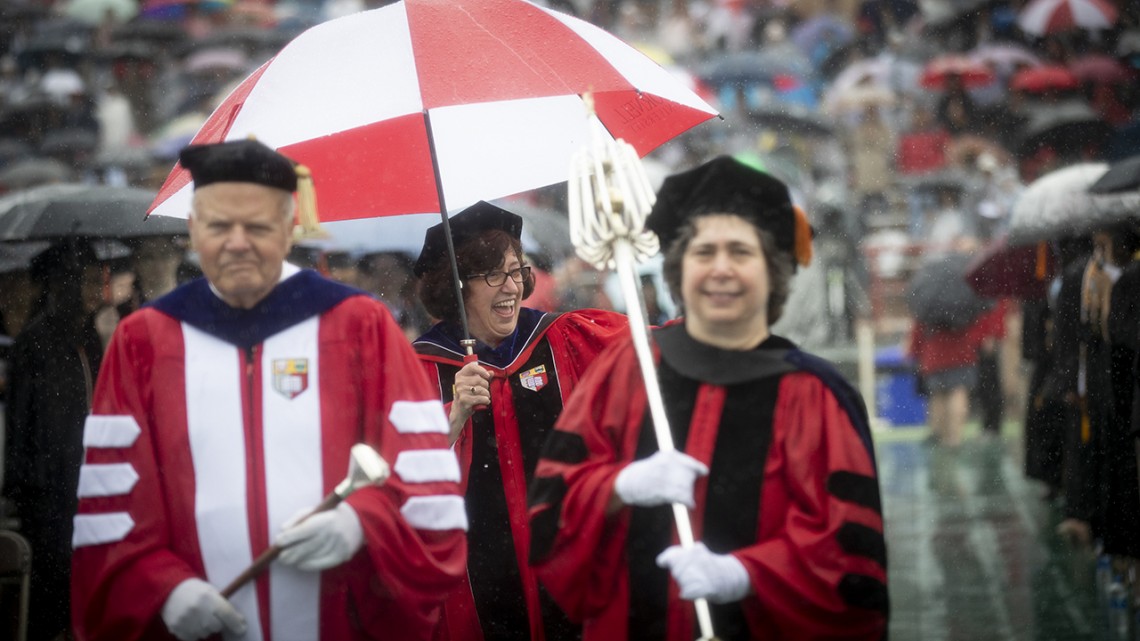
President Martha E. Pollack enters Schoellkopf Stadium behind University Marshal Charles Walcott and Mace Bearer Mariana Wolfner.
‘Soggy, soaked, buoyant but wonderful’ students earn degrees at 150th Commencement
By Daniel Aloi
Cornell held its 150th Commencement ceremony for 5,500 seniors and advanced degree recipients May 27 in Schoellkopf Stadium, during a rainstorm that dampened none of the celebratory event’s spirit for graduates or family members.
“Ladies and gentlemen, there appears to be a bit of a drizzle, but otherwise it’s a beautiful day,” said professor of performing and media arts David Feldshuh, the event’s announcer, during the nearly hourlong procession of gowned students, faculty, trustees and administrators.
“Commencement is always a very special day for a university, but this is a particularly special one, because this is our sesquicentennial, our 150th graduation,” President Martha E. Pollack said. “Today you are not only making your own history, you’re also making history for Cornell. … Class of 2018, we’re not going to let a little rain spoil this, are we? When you look back on today, I want you to think of it as a sunny day.”
With that, she said, she would don “shades,” a pair of Ray-Bans, her de rigueur commencement wear, for the ceremony.
The rains continued through her address and the presentation of degree candidates by their Cornell college deans, some of whom could not help mentioning the weather.
Pollack followed Dean of the Graduate School Barbara A. Knuth’s listing of various graduate degree candidates with: “Dean Knuth, you forgot Master of Meteorology.”
Law School Dean Eduardo Peñalver ’94 said: “President Pollack, I would like to present these soggy candidates for Doctor of Law and Master of Laws …” Pollack followed with: “I hereby confer on each of your soggy candidates …”
Dean Kate Walsh of the School of Hotel Administration: “… these sunny, spectacular candidates …”
Dean Kathryn Boor ’80, Agriculture and Life Sciences: “… these unsinkable candidates …”
Kent Kleinman, Architecture, Art and Planning: “I have the honor to present these buoyant candidates …”
Gretchen Ritter ’83, Arts and Sciences: “President Pollack, I have the distinct honor to present these wet, wonderful candidates who have fulfilled the requirements … “
Pollack said, “It is my honor to recognize these soggy, soaked, buoyant but wonderful candidates,” before conferring degrees and then shaking hands with degree marshals from each college.
Pollack’s address to the graduates focused on heroes and heroism, with an ad lib at its outset. “We live in tumultuous times, we live in wet times, and in such times, it is very important to have heroes … real people who have stood fast and taken difficult actions in the face of enormous challenges,” she said.
She mentioned a picture in her office given to her by photojournalist David Turnley, showing Nelson Mandela visiting his former prison cell, “his arm extended to the barred window, a pensive expression on his face,” she said.
“I’ve often asked myself what he was thinking about as that photo was taken … the 27 years he spent in prison for actions he had taken to rid his nation of apartheid? … all that he’d accomplished since then? Or perhaps, was he thinking about what he hadn’t accomplished – about all the work that remained for South Africa to become the kind of society he envisioned?” she said.
Mandela is one of her heroes, she said, “because of his beliefs and because of his actions. He stood for equality and for the essential dignity of all human beings, and he took courageous steps to move his nation toward one that reflected those principles.”
Mandela also respected the value of education. “As he once said, ‘Education is the most powerful weapon we can use to change the world,” Pollack said.
“I have other heroes, of course. I was going to tell you about Louise Erdrich, the author, but instead I will encourage you to go out and read her books,” she continued. “But I will tell you about a student I’ll call Frank. I first met Frank when he was a sophomore in a discrete math course I was teaching many years ago.”
He struggled with autism spectrum disorder, but “Frank was smart and he was determined, and when he enrolled in my artificial intelligence course as a senior, it was clear that he’d worked extremely hard,” Pollack said.
Frank went on to earn a master’s in information science and move across the country to take a job, she said. “This was a huge and brave step forward, a step toward independence. … Frank is a hero to me for his refusal to be held to limits … and to act courageously in taking steps that would enable him to achieve his goals.”
Pollack said that having heroes can provide hope and “a source of courage. You can remind yourself of what your heroes have been able to do, and use that recollection as a way to bolster yourself. Surely, you tell yourself, if he or she or ze has done X, then I can do Y.”
“So, find yourself some heroes,” she concluded. “They can be people you know or people you admire from afar. They can be like you or different from you. And when you are faced with challenges, use the hope and courage that your heroes inspire in you to be your best self.”
The ceremony, officiated by professor and University Marshal Charles Walcott, included performances by stalwart, soaked members of the Cornell University Glee Club and Chorus and the Wind Symphony.
Media Contact
Get Cornell news delivered right to your inbox.
Subscribe